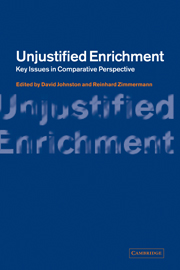Book contents
- Frontmatter
- Contents
- List of contributors
- Preface
- Table of cases
- List of abbreviations
- I Introduction
- II Enrichment ‘without legal ground’ or unjust factor approach
- III Failure of consideration
- IV Duress and fraud
- V Change of position
- VI Illegality
- VII Encroachment and restitution for wrongs
- VIII Improvements
- IX Discharge of another person's debt
- X Third-party enrichment
- XI Proprietary issues
- 20 Proprietary issues
- 21 Property, subsidiarity and unjust enrichment
- XII Taxonomy
- Index
21 - Property, subsidiarity and unjust enrichment
Published online by Cambridge University Press: 31 July 2009
- Frontmatter
- Contents
- List of contributors
- Preface
- Table of cases
- List of abbreviations
- I Introduction
- II Enrichment ‘without legal ground’ or unjust factor approach
- III Failure of consideration
- IV Duress and fraud
- V Change of position
- VI Illegality
- VII Encroachment and restitution for wrongs
- VIII Improvements
- IX Discharge of another person's debt
- X Third-party enrichment
- XI Proprietary issues
- 20 Proprietary issues
- 21 Property, subsidiarity and unjust enrichment
- XII Taxonomy
- Index
Summary
Introduction
If someone were asked, as I was, to write a paper dealing with ‘proprietary issues’ in the law of unjust enrichment, he or she would most naturally think of proprietary consequences: that is, the extent to which unjust enrichments can be reversed by proprietary as opposed to obligationary responses. This of, course, would be an interesting study, although it might lack a certain promise as a comparative work, due to the well-known refusal of civilian systems to have any truck with such odd and uncontrollable devices as the constructive trust. Instead I have chosen to consider the interaction between the law of property and the law of unjustified enrichment from the other end: that is, the extent to which the existence of a proprietary claim affects the availability of a claim in unjustified enrichment. Or, at least, I chose so to begin; for the study grew, as such things will, and in the end it has become a wider look at how and why the availability of unjustified enrichment is conditioned by the existence of other kinds of claims. The focus is on the common law, German law and the law of Quebec.
It can be described, then, as a comparative study of devices for controlling the scope of liability in unjust enrichment; but it must be emphasised that it is a study of only some such devices.
- Type
- Chapter
- Information
- Unjustified EnrichmentKey Issues in Comparative Perspective, pp. 588 - 624Publisher: Cambridge University PressPrint publication year: 2002
- 3
- Cited by



